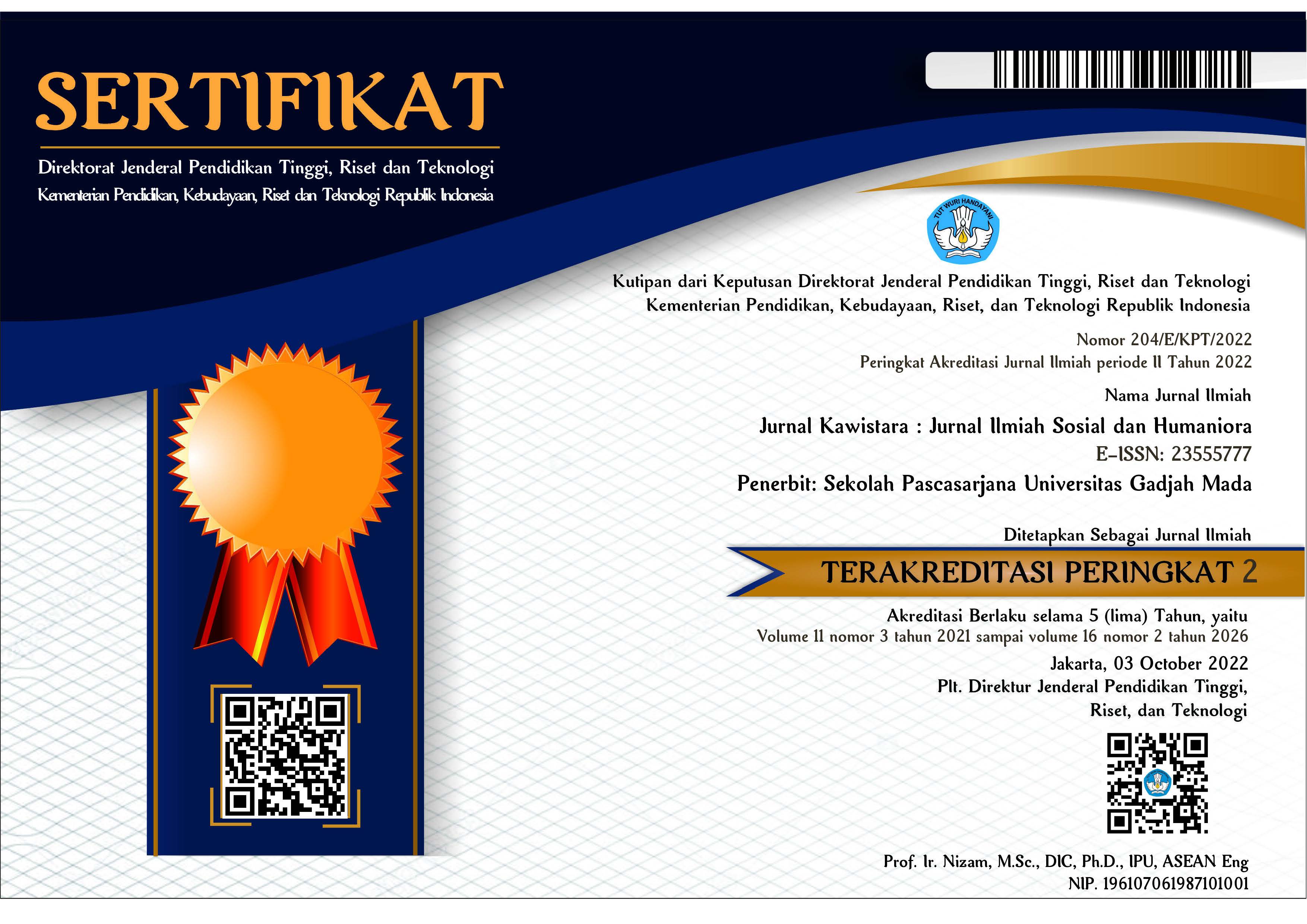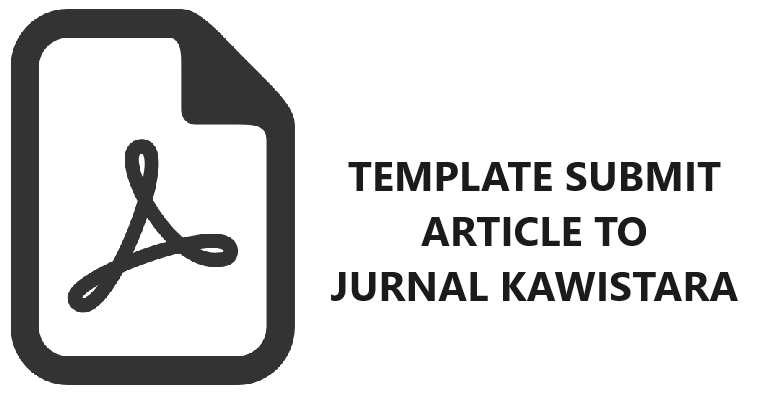RELIGIOUS BLASPHEMY AND MONITORY SOCIETY IN INDONESIAN DIGITAL AGE
Leonard Chrysostomos Epafras(1), Hendrikus Paulus Kaunang(2*), Syamsul Asri(3)
(1)
(2)
(3)
(*) Corresponding Author
Abstract
The present article is a research report on the discourse of religious blasphemy in connection with digital practices in Indonesia. It sought to understand the shift of public participation in shaping the discourse that understood within the framework we identified as “monitory society.” The research employed qualitative approach by using several methods, among others are interview and social media observation. Reflecting upon the current national trends and new shift of political landscape, it appeared that religious blasphemy immersed into the political discourse as weaponized information, hence disrupted the meaning of democracy in digital age, as once become the rhetoric of digital technology. In general, the discourse of religious blasphemy in Indonesia is dealing with public piety and social order. It concerned more on religious boundary rather than the improvement of religious lives and personal piety.
Keywords
Full Text:
PDFReferences
Ammerman, N. T. (ed.) (2007). Everyday religion: observing modern religious lives. Oxford: Oxford University Press.
Baker, C. E. (2006). Media Concentration and Democracy: Why Ownership Matters. Cambridge: Cambridge University Press.
Bayuni, E. (2011). “Bloody Blasphemy: Antagonizing Religious Minorities in Indonesia and Pakistan”, Asia Pacific Bulletin, 97. Available at: https://scholarspace.manoa.hawaii.edu/bitstream/10125/19843/1/apb097_5.pdf.
Crumley, C. L. (1995). “Heterarchy and the analysis of complex societies”, Archeological Papers of the American Anthropological Association, 6: 1–5.
Deibert, R. J. et al. (eds) (2012). Access contested: security, identity, and resistance in Asian cyberspace information revolution and global politics. Cambridge: MIT Press.
Deleuze, G. and Guattari, P.-F. (1987). A Thousand Plateaus: Capitalism and Schizophrenia. Translated by B. Massumi. Minneapolis: University of Minnesota Press.
Epafras, L. C. (2016). “Religious e-Xpression among the Youths in the Indonesian Cyberspace”, Jurnal Ilmu Komunikasi, 13(1): 1–18.
Epafras, L. C. (2019). “‘Imagined Immunities:’ Religion, Governmentality and Civility in Indonesian Cyberspace”, in Sofjan, D. (ed.). Religion in Public Sphere. Forthcoming. Geneva: Globethics.net.
Epafras, L. C., Djalong, F. A. and Kaunang, H. P. (2018). “Beyond Signal and Noise: Academics goes Hoax and Hoaxtivism”, Kawistara, 8(3): 347-261.
Fiss, J. (2016). Anti-blasphemy offensives in the digital age: When hardliners take over. Washington D.C.: The Brookings Institution.
Foucault, M. (1991). The Foucault effect: studies in governmentality with two lectures by and an interview with Michel Foucault. Edited by G. Burchell, C. Gordon, and P. Miller. Chicago: University of Chicago Press.
Fraser, M. and Dutta, S. (2008). Throwing sheep in the boardroom: how online social networking will transform your life, work and world. Hoboken: Wiley.
Grim, B. J. (2012). “Laws Penalizing Blasphemy, Apostasy and Defamation of Religion are Widespread.” Pew Research Center. Accessed: 22 August 2018. Available at: http://www.pewforum.org/2012/11/21/laws-penalizing-blasphemy-apostasy-and-defamation-of-religion-are-widespread/.
Hasani, I. (2016). “The Decreasing Space for Non-Religious Expression in Indonesia: The Case of Atheism”, in Lindsey, T. and Pausacker, H. (eds) Religion, Law and Intolerance in Indonesia. Amazon Kindle. London: Routledge, pp. 197–210.
Hefner, R. W. (2018). “Indonesia at the crossroads: imbroglios of religion, state, and society in an Asian Muslim nation”, in Hefner, R. W. (ed.). Routledge handbook of contemporary Indonesia. London: Routledge, pp. 3–30.
Hosen, N. (2016). “Race and Religion in the 2012 Jakarta Gubernatorial Election”, in Lindsey, T. and Pausacker, H. (eds) Religion, Law and Intolerance in Indonesia. Amazon Kindle. London: Routledge, pp. 180–194.
Hukumonline.com (2017). “Vonis Kasus Penodaan Agama Rata-Rata 2 Tahun”, hukumonline.com. Accessed: 27 May 2018. Available at: http://www.hukumonline.com/berita/baca/lt58a2c0a8bc3ac/vonis-kasus-penodaan-agama-rata-rata-2-tahun.
Husein, F. (2005). Muslim-Christian relations in the New Order Indonesia: the exclusivist and inclusivist Muslims’ perspectives. Bandung: Mizan.
Jurriëns, E. and Tapsell, R. (eds) (2017). Digital Indonesia: connectivity and divergence. Singapore: ISEAS - Yusof Ishak Institute.
Keane, J. (2010). The Life and Death of Democracy. Reprint edition. London: Simon & Schuster.
Keane, J. (2011). “Monitory Democracy?”, in Alonso, S., Keane, J., and Merkel, W. (eds). The Future of Representative Democracy. Cambridge: Cambridge University Press, pp. 212–235.
Keane, J. (2013). Democracy and media decadence. Cambridge: Cambridge University Press.
Kluver, R. and Banerjee, I. (2005). “Political Culture, Regulation, and Democratization: The Internet in nine Asian nations”, Information, Communication and Society, 8(1): 30–46.
Levy, L. W. (1998). Blasphemy: Verbal Offense Against the Sacred, from Moses to Salman Rushdie. Chapel Hill: The University of North Carolina Press.
Levy, L. W. (2005). “Blasphemy: Christian Concept”, Encyclopedia of Religion. 2nd ed. Edited by L. Jones. Detroit: Macmillan Reference USA.
Lindsey, T. and Pausacker, H. (eds). (2016). Religion, Law and Intolerance in Indonesia. Amazon Kindle. London: Routledge.
Lynn, K. (2015). Between court and confessional: the politics of Spanish inquisitors. Cambridge: Cambridge University Press.
Majelis Ulama Indonesia (2017). Fatwa Majelis Ulama Indonesia Nomor 24 Tahun 2017 tentang Hukum dan Pedoman Bermuamalah Melalui Media Sosial. Jakarta: Majelis Ulama Indonesia.
Muhajir, A., Artawan, E. J. and Adnyana, P. (2013, 27 January). “Kontroversi Pengaku Raja Majapahit Bali”, Balipublika.
Mujiburrahman (2006). “Feeling Threatened: Muslim-Christians in Indonesia’s New Order.” PhD Dissertation. Utrecht: ISIM.
Nguyen, C. T. (2018). “Why it’s as hard to escape an echo chamber as it is to flee a cult”, Accessed: 9 April 2018. Aeon. Available at: https://aeon.co/essays/why-its-as-hard-to-escape-an-echo-chamber-as-it-is-to-flee-a-cult.
Nugroho, A. and Oetomo, B. S. D. (eds). (2018). Pedoman Penggunaan Media Sosial. Jakarta: Tim Komisi KOMSOS KWI.
Nunes, M. (2012). “Abusing the Media Viral Validity in a Republic of Spam”, in Gournelos, T. and Gunkel, D. J. (eds). Transgression 2.0: media, culture, and the politics of a digital age. Amazon Kindle. New York: Continuum, pp. 154–168.
PGI (2018). Warga Gereja Merespon Revolusi Media Sosial: Panduan Bermedia Sosial. Jakarta: Persekutuan Gereja-gereja di Indonesia.
Postill, J. and Epafras, L. C. (2018). “Indonesian Religion as a Hybrid Media Space: Social Dramas in a Contested Realm”, Asiascape: Digital Asia, 5(1): 100–123.
Powe, L. A. (1992). The fourth estate and the Constitution: freedom of the press in America. Berkeley: University of California Press.
Raharjo, B. (2017). “The State of Cybersecurity in Indonesia”, in Jurriëns, E. and Tapsell, R. (eds). Digital Indonesia: connectivity and divergence. Singapore: ISEAS - Yusof Ishak Institute, pp. 110–123.
Rismoyo, M. (2018). “Dituding Nistakan Agama, IG Tretan Muslim-Coki Pardede Digeruduk Netizen”, detikHot. Accessed: 21 October 2018. Available at: https://hot.detik.com/celeb/d-4265648/dituding-nistakan-agama-ig-tretan-muslim-coki-pardede-digeruduk-netizen.
Seo, M. (2013). State Management of Religion in Indonesia. London: Routledge.
Wardah, F. (2017). “Setara Institute: 97 Kasus Penistaan Agama Terjadi di Indonesia,” VOA Indonesia. Accessed: 22 August 2018. Available at: https://www.voaindonesia.com/a/setara-institute-terjadi-97-kasus-penistaan-agama-/3848448.html.
Zuidweg, N. (2018). “The Secularity Debate in Indonesia: Ahok’s Blasphemy Case.” Master Thesis. Utrecht: Utrecht University.
Article Metrics
Refbacks
- There are currently no refbacks.
Copyright (c) 2019 Leonard Chrysostomos Epafras, dkk

This work is licensed under a Creative Commons Attribution-ShareAlike 4.0 International License.
Jurnal Kawistara is published by the Graduate School, Universitas Gadjah Mada.











